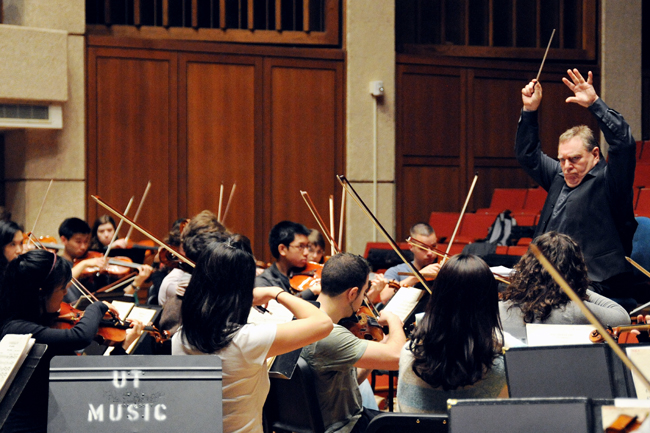If professor Gerhardt Zimmermann had a choice, he would play second base for the Cincinnati Reds. Polio knocked the wind out of that.
But then again, until his first rehearsal after making second trumpet for Bowling Green State University as a freshman, he had never heard a full live orchestra.
“When I heard the strings, a light bulb went off,” Zimmermann said. “That changed my life, to hear all of the additional orchestral colors was just not the same. It was like going from a 24 crayon box to a 64 crayon box. All those other colors. That’s when I decided I wanted to be a conductor: an orchestral conductor.”
Because he contracted polio when he was seven years old, Zimmermann wears two leg braces, but he doesn’t let that get in the way of his work. Like most conductors, he sits during rehearsals and stands during concerts, but Zimmermann said the most difficult part of being a conductor with a disability is getting over the prejudice.
“The problem is that people will look at a person with disabilities and they decide what they can do or not,” Zimmermann said. “Nobody decides that for me. I decide that.”
Roger Myers, professor of viola and chairman of strings division at UT, said that Zimmermann has a tested knowledge from a career of conducting symphony orchestras.
“He teaches through his conducting itself so as you watch it, you’re also watching someone who conveys his authority through the end of his baton,” Myers said. “It’s completely demonstrative without using words. When he uses words, he has a sense of immense knowledge behind what he says and he can tell students what he wants quickly and he doesn’t need to talk to get his point across.”
Meredith Riley, who completed her bachelor’s degree at UT and is now pursuing an artist degree in violin performance, referenced a speech that famous violinist David Kim once gave about how even the best performer needs to be a good person to be successful.
“I think that speaks volumes about a lot of musicians, but for ‘Z’ especially because I’m sure that there were good candidates that came up for the job, and despite polio, despite whatever, despite age, the [reality was] that ‘Z’ got the job,” Riley said.
In her five years studying under Zimmermann, Riley said that she has never thought of him as disabled.
“And that’s probably because he’s such a good conductor,” Riley said. “I know ‘Z’ used to want to be a baseball player when he was a kid, so I guess, in a weird way, him getting polio as a kid was a really great thing for the music world rather than him becoming a baseball player. You want to be an all-star but instead you’re a rock star.”
Zimmermann is one of the main reasons that Riley returned after receiving her undergraduate degree.
“If he’s really into something, and it’s an exciting thing, he’ll even start to do a little dance on the podium,” she said. “‘Z’ will usually say, ‘If you can see the whites of my eyes when I look at you, that means play out.’ I don’t think I’ll ever have a conductor like him again, that you can just joke with, that can just joke about himself, and make mistakes and not feel bad about it.”
Riley recalled one time during a concert when Zimmermann’s arm got stuck in the air while he was conducting.
“He just turned around [and] said, ‘I just recently got shots in my arm.’ In this situation, there are 4000 things you can do,” Riley said. “The thing that was amazing to me was that he let everybody know what was going on, mid-concert, which was something I had never experienced before. I was amazed with his knowledge of how to communicate with a crowd.”
Zimmermann said that classical musicians need to break down the wall between themselves and their audiences because walking onstage, smiling and simply playing doesn’t work anymore.
“You need to sell the humanity of the art itself,” he said. “The more conductors and artists that can do that, the better off classical music is going to be.”
Zimmermann said there’s no greater thing in the world to a musician than a concert that seems to exceed expectations.
“The music says so much more to me and for me, so much more than words could ever say,” he said. “[Music] takes me far away from any sense of having a disability whatsoever. You can experience so many different emotions just by listening to music. And to be conducting it in front of an orchestra and all of that sound is coming to you. It’s unbelievable. I don’t need anything, really, but this.”
Published on February 18, 2013 as "Professor orchestrates inspiration".




















